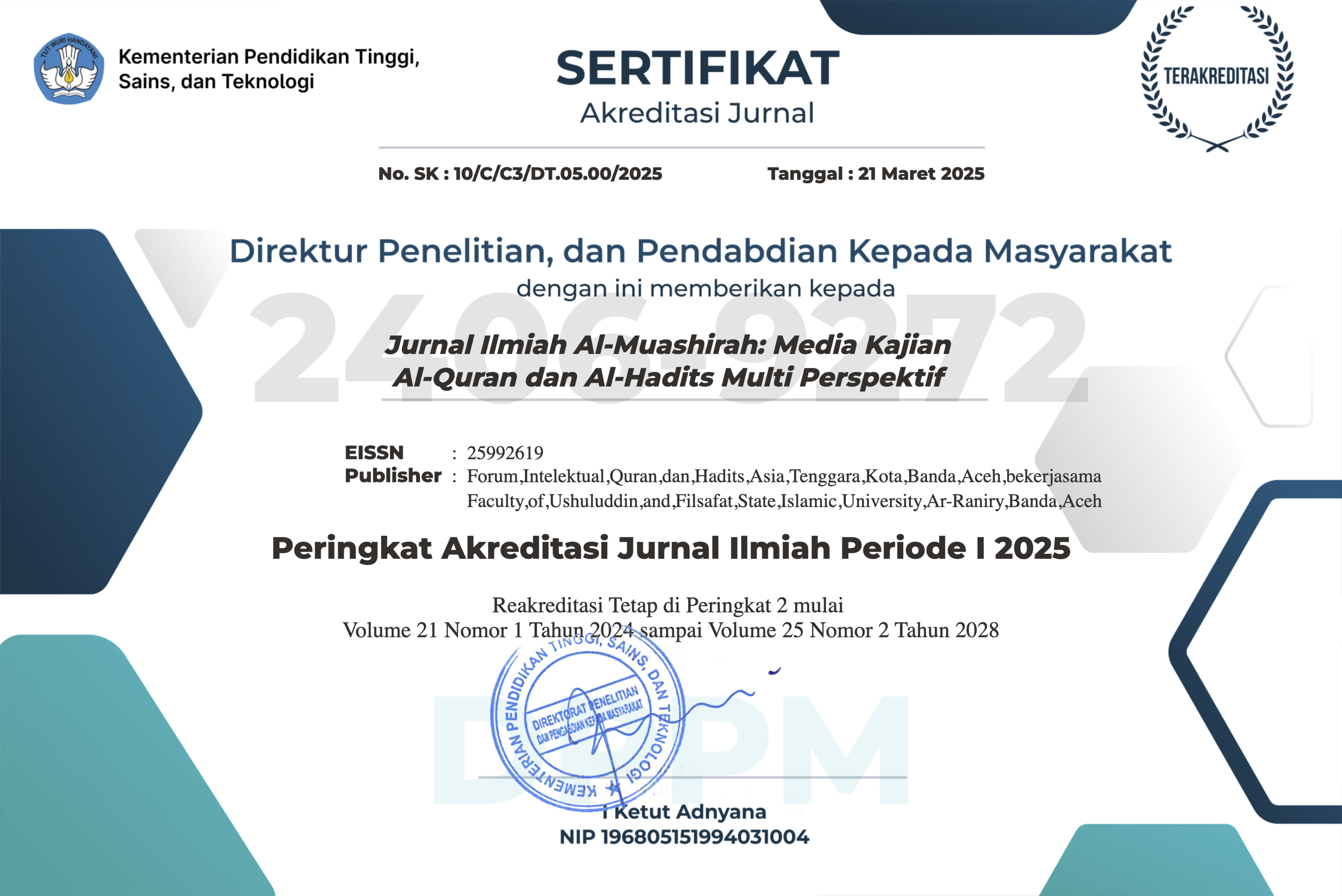Acculturation of Religion and Local Culture in the Ashura Mandoa Tradition among the Jorong Lubuk Alung Community: A Study of Living Hadith
DOI:
https://doi.org/10.22373/jim.v21i2.24606Keywords:
Living Hadith, Acculturation of Local Culture and Religion, Mandoa Asyura Tradition.Abstract
Mandoa Asyura is a tradition practiced by the community, passed down from generation to generation on the 10th of Muharram. This tradition is considered obligatory as a form of respect for the month of Muharram, especially on the day of Ashura. The community also believes that this tradition is directly based on the Prophet's hadith, which commands fasting. However, the implementation of this tradition is not limited to the Sunnah fast; the community also carries out various traditional rituals. This research is a study of Living Hadith using qualitative methods and a phenomenological approach. The findings indicate that Mandoa Asyura originated from the teachings of Syaikh Burhanuddin, a scholar who spread Islam in West Sumatra, and is practiced as a form of respect for the month of Muharram, which is rich in historical significance, religious values, and social aspects. The community also believes that this tradition holds spiritual wisdom for Muslims, such as the Apam cake, which is interpreted as the umbrella of Siti Fatimah and a protector for those who perform Mandoa Asyura on the Day of Judgment. The two boiled eggs symbolize the acceptance of the repentance of Prophet Adam and Hawa, and the stir-fried fern symbolizes simplicity. Other findings show that the practice of Mandoa Asyura by the community serves as a means of drawing closer to Allah SWT, reflecting on the events of Ashura, and as a form of self-introspection in leading a righteous life.Downloads
References
Ahmad ’Ubaydi Hasbillah, Ilmu Living Qur’an-Hadis (Ontologi, Epistemologi Dan Aksiologi) (Maktabah Darus Sunnah, 2019)
al-Bukhari, Muhammad bin Ismail, Shaih Bukhari, Kitab : Al-Saum, Bab : Saum Yaum al-Asyura, (Maktabah al-Malik Ibn Su’ud, 2001)
Alwi, Zulfahmi, Akbar Akbar, Amin Hady, Abdul Muiz Amir, Jawiah Dakir, and Latifah Abdul Majid, ‘The Anomaly of Good-Looking : The Relationship between Spirituality and Extremism on Hadith and Social Religious Perspective’, QIJIS (Qudus International Journal of Islamic Studies), 9.2 (2021), p. 463, doi:10.21043/qijis.v9i2.10476
Andrianto, TK Ibrahim, Wawancara Dengan Ulama Pariaman, 2021
Anilta Hidayah, ‘Praktik Ritual Satu Muharram Di Desa Traji Kecamatan Parakan Kabupaten Temanggung (Kajian Living Hadits)’ (UIN Walisongo, 2019)
Dwi Putra, Defani Mauludi, ‘Landasan Teologi Dalam Tradisi Asyura Masyarakat Syiah Di Desa Pasirhalang’, Jurnal Penelitian Ilmu Ushuluddin, 2.3 (2022), pp. 600–614, doi:10.15575/jpiu.17009
Eva Endriani, Wawancara Dengan Masyarakat Lubuk Alung Kabupaten Agam, Indonesia, 2020
Haji Pirin, Buku Doa (1992)
Komariah, ‘Tradisi Asyura (Studi Living Hadis Di Kampung Cihaseum Desa Kupahandap Kecamatan Cimanuk Kabupaten Pandeglang.’ (UIN Sultan Maulana Hasanuddin Banten, 2020)
Mukaromah, Kholila, and Ulfah Rahmawati, ‘The Influence Of The One Day One Juz (ODOJ) Movement On The Tradition Of Reciting Qur’an’, 3.2 (2015)
Nasir, Mohamad Abdun, ‘Revisiting the Javanese Muslim Slametan: Islam, Local Tradition, Honor and Symbolic Communication’, Al-Jami’ah: Journal of Islamic Studies, 57.2 (2019), pp. 329–58, doi:10.14421/ajis.2019.572.329-358
Oktafia, Renny, and Imron Mawardi, ‘IslamIc Values In The TradITIon of samIn communITy In easT JaVa’, 5.1 (2017)
Puyu, Darsul S., Subehan Khalik Umar, Hasdin Hanis, Bustanul Arifin, and Muhammad Abili, ‘Mansai in the Marriage Tradition of the Banggai Ethnic in Central Sulawesi, Indonesia: A Living Sunnah Perspective’, Samarah: Jurnal Hukum Keluarga Dan Hukum Islam, 7.3 (2023), p. 1352, doi:10.22373/sjhk.v7i3.16510
Saifuddin dan Subkhani Kusuma Dewi, Living Hadis (Praktik, Resepsi, Teks Dan Transmisi) (Q-Media, 2018)
Saputra, Edriagus, ‘Tradisi Menghiasi Hewan Kurban pada Masyarakat Kenagarian Bawan’, FOKUS Jurnal Kajian Keislaman dan Kemasyarakatan, 4.1 (2019), p. 1, doi:10.29240/jf.v4i1.763
Saputra, Edriagus, Samiullah Taraki, Nana Gustianda, and Zakiyah Zakiyah, ‘The Effect of Mamakiah Tradition toward Students’ Education in Padang Pariaman Traditional Islamic Boarding School’, FOKUS Jurnal Kajian Keislaman Dan Kemasyarakatan, 7.1 (2022), p. 1, doi:10.29240/jf.v7i1.3577
Saputra, Edriagus, Zakiyah Zakiyah, and Dian Puspita Sari, ‘Kerukshahan Meninggalkan Shalat Jum’at Pada Hari Raya Idain (Studi Takhrij Hadis)’, FOKUS Jurnal Kajian Keislaman dan Kemasyarakatan, 5.2 (2020), p. 237, doi:10.29240/jf.v5i2.1911
Warsah, Idi, Yusron Masduki, Imron Imron, Mirzon Daheri, and Ruly Morganna, ‘Muslim Minority in Yogyakarta: Between Social Relationship and Religious Motivation’, QIJIS (Qudus International Journal of Islamic Studies), 7.2 (2019), p. 367, doi:10.21043/qijis.v7i2.6873
Andrianto, TK Ibrahim, Interview with a Scholar from Pariaman, 2021.
Syarizal Efendi. TK. Bagindo, Interview with a Scholar from Padang Pariaman, 2021
Tuangku Mhd. Walid Nusalam, Interview with a Scholar from Padang Pariaman, 2021
Tuangku Rahmat, Interview with a Scholar from Lubuk Alung, 2022
Tuangku Rahmat, Interview with a Scholar of the Syatariyah Order from Lubuk Alung, 2020
Tuangku Rusli, Interview with a Scholar from Lubuk Alung, 2022
Tuangku Sidi Ali Basar, Interview with a Community Scholar from Lubuk Alung, 2022
Downloads
Published
Issue
Section
License
Authors who publish in Jurnal Ilmiah Al-Mu'ashirah agree to the following terms:
- Authors retain copyright and grant the journal right of first publication with the work simultaneously licensed under a Attribution-ShareAlike 4.0 International (CC BY-SA 4.0) License that allows others to share the work with an acknowledgment of the work's authorship and initial publication in this journal.
- Authors are able to enter into separate, additional contractual arrangements for the non-exclusive distribution of the journal's published version of the work (e.g., post it to an institutional repository or publish it in a book), with an acknowledgment of its initial publication in this journal.
- Authors are permitted and encouraged to post their work online (e.g., in institutional repositories or on their website) prior to and during the submission process, as it can lead to productive exchanges, as well as earlier and greater citation of published work (See The Effect of Open Access).













